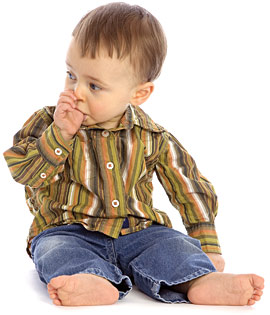Thumb Sucking in Children
A normal behavior that bears watching

Dear Doctor,
My three-year old daughter seems to continually suck her thumb or fingers. Is this a problem and will it damage her teeth?
Dear Sheryl,
Sucking fingers or thumbs is completely normal for babies and young children. Babies actually begin to suck on their fingers or thumbs even before they are born. The behavior provides security for young babies. It's a way to make contact with, test and learn about the world. Recent studies have shown that pacifier use after the age of two may cause long term changes in the mouth of children and therefore recommend that pacifier use should stop by 18 months. Thumb and digit sucking tend to stop between two and four years of age without much intervention. However, some children repeatedly suck on a finger, thumb, pacifier or other objects over long periods of time. In these children, the upper front teeth may tip toward the lip or not come into position properly and the upper jaw may not develop correctly.
The American Academy of Pediatric Dentistry recommends that parents or caregivers encourage children to cease these habits by age three.
Make sure your child is seeing a general dentist or pediatric dentist (a dentist who has taken specialty training in children's dentistry), who will carefully watch the way your child's teeth and jaws develop, keeping the sucking habit in mind at all times. Your general or pediatric dentist can also offer creative strategies to cut back and stop pacifier use in gentle ways as well as offer positive reinforcement behavior management techniques for these habits. Behavior modification starts with appropriate rewards given at predetermined intervals or steps for both thumb and pacifier habits to gradually eliminate them. Another idea you might try is tying the pacifiers (all of them) onto helium balloons and floating them into the sky. This makes a “special star” for the child so the tooth fairy can find him or her and put a present under the pillow as a reward for stopping. Perhaps another approach is dropping off the pacifiers at the dentist's office so that they can be given to a “baby” who needs them. For most children the American Academy of Pediatric Dentistry recommends encouraging these habits cease by age three.
Some children may need the help of both their parents and their pediatric dentist. A pacifier habit is often easier to break than a finger or thumb. When your child is old enough to understand the possible results of a sucking habit, a pediatric dentist (or a general dentist trained in pediatric techniques), can encourage your child to stop, as well as talk about what happens to the teeth if your child doesn't stop. This advice, along with support from parents, helps most children stop. If this approach doesn't work a mouth appliance that blocks sucking habits may be recommended.
A final point, make sure that you are fully informed of the problem and solutions. This is probably normal behavior so don't make it your child's problem unnecessarily. If you are still worried visit your general dentist or a pediatric dentist to put your mind at rest.



